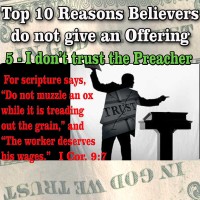

Read: I Cor. 9:7-12 |
Pimp Preacher.com {Link). While I do not endorse the site, I ran across it while researching the topic for this posting.
The stated purpose of the site is to “serve as an archive of preachers we consider to be either False Prophets, or direct threats to the Body of Christ. PimpPreacher.com is also the first line of defense against Predatory Tithing Doctrines …”
Apparently the site has touched a nerve, because it appears to have an active following via social media and radio and is quoted by news media. As I reviewed it circumspectly, I realized that they support my supposition that Pastors involved in financial dishonesty disrupt a believer’s faith and that dissuades them from giving an offering. Let’s explore this thought further.
Reason – “I don’t trust the Preacher”
After sharing stewardship messages over the years, I have heard from and read about Believer’s who note that they don’t quite know if they trust the preacher with all of their money. Repeating a medley of their “spiritual” observations and comments, it might sound like ….
I don’t know if I really trust the Preacher with all this tithe and offering money we are collecting. Just look around! I see preachers living in mansions, owning airplanes and riding in luxury cars. Aren’t they supposed to be praying “for us”? Snap, from the way they live it seems like they are preying “on us” and using my tithes for themselves!
In their sermons, they ask for more, more and more! Some even sell prayed-over trinkets through their TV ministry to raise more money. Others preach a Prosperity Gospel, which essentially says that I should give to get. It seems like “they” are the main ones who are prospering!
How can I trust that they will invest the money in Kingdom business and not divert it for their clothing allowance or addition to their vacation home?
I’m sorry, I’m just skeptical!
Spiritual Reflection
The Bible has something to say about these pointed observations and prickly opinions. These questions and concerns are timeless – they are not new!
I Tim 3:2-3 provides the characteristics of a “good shepherd”, which can be used as a mirror. It points out: “Now the overseer is to be above reproach, faithful to his wife, temperate, self-controlled, respectable, hospitable, able to teach, not given to drunkenness, not violent but gentle, not quarrelsome, not a lover of money.”
A Pastor holds a divine appointment, not a human anointment. While they are human and thus sinful, they are held to a higher standard. As they walk with God, the fruits of their labor blesses the Church. [Hebrews 13:7; I Tim. 3:2-7; 1 Pet 5:2-3]
The Bible also reminds us to be wary of “false shepherds”. God holds them accountable and provides guidance on how to identify them (Deut. 13:1–5; Isa. 44:25; 6:5, 9-11; 2 Pet. 2; Jude).
Given the above scriptural basis for comparison, I trust that your Pastor is a “good shepherd”. If still challenged and skeptical, submit to fervent prayer about your concerns. By prayerfully beseeching God for enlightenment and assurance, He will reveal what He wants you to do.
If you still cannot do that, find another Church body with a Pastor that meets the profile of a “good shepherd”. Otherwise, Satan would love to pick at the wound and thereby infect others in the congregation.
The scripture is clear, God knows who is a faithful servant and as you pray He will lead you to a Pastor and a church that does P-R-A-Y and not P-R-E-Y.
Series Index
Overview Part 1 – Personal Bias Reasons
Overview Part 2 – Church / Religious Bias Reasons
- I don’t believe the Tithe is Biblical for the New Testament Church
- I’m afraid to trust God with my offering
- I don’t know where the money is going
- I don’t agree with where the money is going
- I don’t trust the Preacher
- I think the Church is always begging for money
- I give elsewhere
- I give when I want to give
- I only have a little to give
- I don’t have anything to give
Questions:
1. Discover –
A. Do you trust your Pastor and staff with your offering? If not, do you have a biblical basis?
B. How do others opinions about the Pastor and staff affect your giving?
2. Develop –
A. If you feel you have a trust issue, have you submitted yourself in prayer? What was God’s answer?
B. If your church holds regular business meetings for the benefit of the congregation, attend these meetings and read the financial reports. These should define the budgeted amounts for paid staff, and how much they are actually receiving.
3. Demonstrate –
A. Discuss with a prayer partner better ways that you can approach supporting the Pastor and staff as they seek to serve God.
